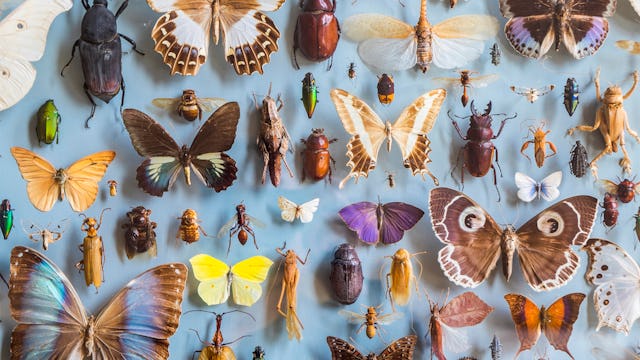New Report Says Insects Could Be Extinct In A Century

Insect populations are plummeting – and one in three bugs are endangered, according to a new report
The first global scientific report of worldwide insect populations are both depressing and terrifying: more than 40 percent of insect species are declining, and one out of three species is endangered. Insects are becoming extinct eight times faster than vertebrates, and their overall population is dropping by an estimated 2.5 percent each year – which means they could be totally gone in a century.
The report, which is being exclusively covered by The Guardian, was written by Francisco Sánchez-Bayo at Australia’s University of Sydney and Kris Wyckhuys at the China Academy of Agricultural Sciences in Beijing. It was a meta analysis of 73 of the best available studies of insect populations around the world.
At first, hearing that there are fewer and fewer bugs in the world might seem like a good thing. But if you look at how insects are the foundation of our food chain – and have 17 times the mass of the human population – it’s easy to see that a significant loss of insects will mean widespread devastation of our ecosystem.
“If insect species losses cannot be halted, this will have catastrophic consequences for both the planet’s ecosystems and for the survival of mankind,” said Sánchez-Bayo.
“The evidence all points in the same direction,” Professor Dave Goulson at the University of Sussex told The Guardian. “It should be of huge concern to all of us, for insects are at the heart of every food web, they pollinate the large majority of plant species, keep the soil healthy, recycle nutrients, control pests, and much more. Love them or loathe them, we humans cannot survive without insects.”
In other words: this is extremely bad news, and the report’s authors are not mincing their words. We’re most probably facing the sixth mass extinction in the history of earth, and it could happen pretty fast and effect us pretty soon.
Here are some more scary facts from the report, just in case you don’t have enough problems in your life already:
Puerto Rico has seen a 95 percent decline in ground insect species in the last 25 years. The United Kingdom has seen a 58 percent fall in butterfly species. Honey bee populations in the United States have dropped almost by half since 1947. Germany is reporting 75 percent insect losses in its protected areas.
What’s causing these terrible losses in the insect world?
“The main cause of the decline is agricultural intensification,” Sánchez-Bayo said. “That means the elimination of all trees and shrubs that normally surround the fields, so there are plain, bare fields that are treated with synthetic fertilizers and pesticides.”
Therefore, it makes sense that insect populations have been dropping at the same rates that large-scale agriculture has developed– and it’s only going to get worse as more powerful and damaging insecticides and fertilizers continue to come on the market.
In addition to pesticides and industrial farming ruining the earth, global warming is also playing a significant role in the issue. While some bugs are hardy when it comes to temperature ranges, many are very sensitive to the climate and need very specific environments to survive.
“Unless we change our ways of producing food, insects as a whole will go down the path of extinction in a few decades,” the report states. “The repercussions this will have for the planet’s ecosystems are catastrophic to say the least.”
What can we possibly do to help this issue? The report writers strongly suggest, “A rethinking of current agricultural practices, in particular a serious reduction in pesticide usage and its substitution with more sustainable, ecologically-based practices, is urgently needed to slow or reverse current trends, allow the recovery of declining insect populations and safeguard the vital ecosystem services they provide. In addition, effective remediation technologies should be applied to clean polluted waters in both agricultural and urban environments.”
In other words, we need to treat our world better. What can you do on an individual level? Spring for organic food if you can. And support politicians who push agricultural reform, care about the environment, and believe in climate change.